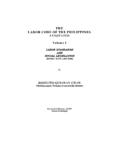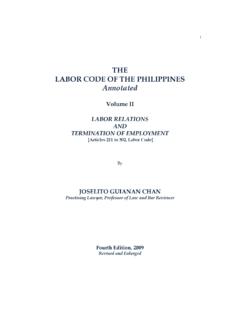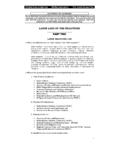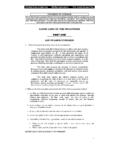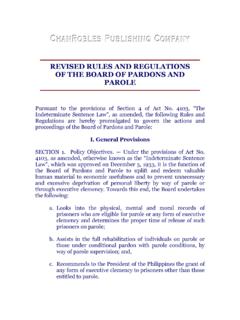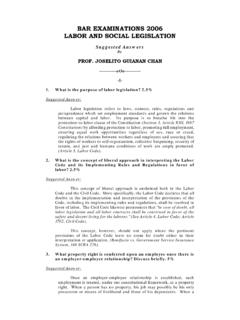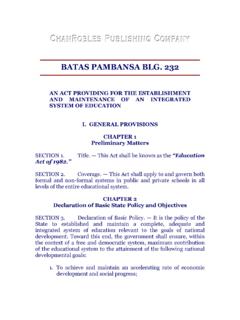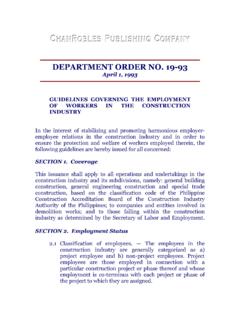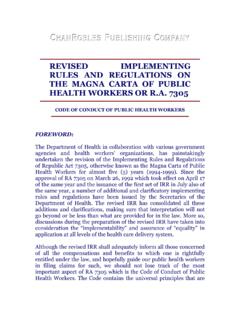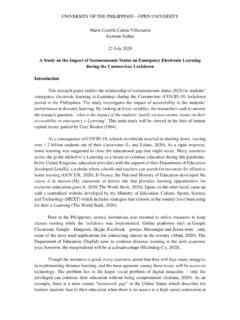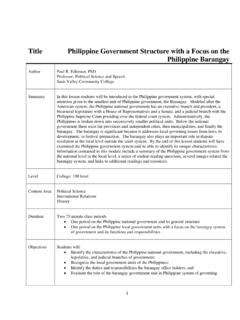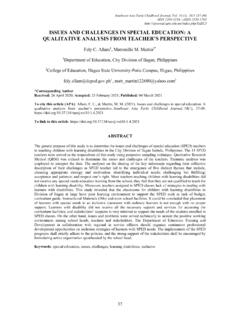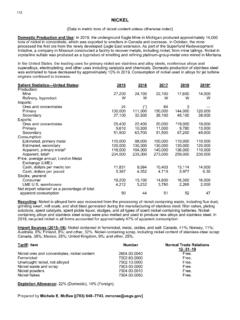Transcription of LABOR LAWS OF THE PHILIPPINES - ChanRobles
1 Pre-Week Guide on LABOR Law 2006 Bar Examinations Prof. Joselito Guianan Chan 1 STATEMENT OF COVERAGE This Pre-Week Guide is presented in the form of an outline of basic principles which bar reviewees may use as a quick guide on the significant areas of LABOR law in the 2006 Bar Examinations. This is presented in three (3) parts. PART ONE covers Books 1 to 4 of the LABOR Code and some important social legislations. PART TWO covers Book 5 and PART THREE covers Books 6 and 7 of the LABOR Code. LABOR LAWS OF THE PHILIPPINES PART TWO LABOR RELATIONS LAW 1. What is the distinction between LABOR relations and LABOR standards ? LABOR relations - refers to that part of LABOR law which regulates the relations between employers and workers.
2 Example: Book V of the LABOR Code which deals with LABOR organizations, collective bargaining, grievance machinery, voluntary arbitration, conciliation and mediation, unfair LABOR practices, strikes, picketing and lockout. LABOR standards - refers to that part of LABOR law which prescribes the minimum terms and conditions of employment which the employer is required to grant to its employees. Examples: Books One to Four of the LABOR Code as well as Book VI thereof which deal with working conditions, wages, hours of work, holiday pay and other benefits, conditions of employment of women, minors, househelpers and homeworkers, medical and dental services, occupational health and safety, termination of employment and retirement.
3 2. What are the quasi-judicial bodies which exercise jurisdiction over LABOR cases? A. With Original Jurisdiction: LABOR Arbiters; National LABOR Relations Commission (NLRC); Secretary of LABOR and Employment/his duly authorized representatives; DOLE Regional Directors/duly authorized hearing officers; Grievance Machinery and Voluntary Arbitrators; Bureau of LABOR Relations (BLR)/Regional Office; Med-Arbiters; National Conciliation and Mediation Board (NCMB); and philippine Overseas Employment Administration (POEA). B. With Appellate Jurisdiction: National LABOR Relations Commission (NLRC); Secretary of LABOR and Employment; and Director of the Bureau of LABOR Relations. C. With Special Powers: Secretary of LABOR and Employment; National LABOR Relations Commission (NLRC); National Conciliation and Mediation Board (NCMB); President of the PHILIPPINES ; and Regional Tripartite Wages and Productivity Board (RTWPB) / National Wages and Productivity Commission (NWPC).
4 D. Jurisdiction over social security benefits claims: Pre-Week Guide on LABOR Law 2006 Bar Examinations Prof. Joselito Guianan Chan 2 Social Security System (SSS); Government Service Insurance System (GSIS); and philippine Health Insurance Corporation (PHIC). JURISDICTION OF LABOR ARBITERS 3. What is the nature of jurisdiction of LABOR Arbiters? The jurisdiction is original and exclusive in nature. LABOR Arbiters have no appellate jurisdiction. 4. What are the cases falling under the jurisdiction of the LABOR Arbiters? LABOR Arbiters have jurisdiction over the following cases 1. Unfair LABOR practice (ULP) cases; 2. Termination disputes (or illegal dismissal cases); 3. Cases that workers may file involving wages, rates of pay, hours of work and other terms and conditions of employment, if accompanied with claim for reinstatement; 4.
5 Claims for actual, moral, exemplary and other forms of damages arising from the employer-employee relations; 5. Cases arising from any violation of Article 264 of this Code, including questions involving the legality of strikes and lockouts; and 6. Except claims for Employees Compensation, Social Security, Medicare and maternity benefits, all other claims arising from employer-employee relations, including those of persons in domestic or household service, involving an amount exceeding five thousand pesos (P5, ) regardless of whether accompanied with a claim for reinstatement. 5. What are the money claims over which LABOR Arbiters have jurisdiction? Money claims falling within the original and exclusive jurisdiction of the LABOR Arbiters may be classified as follows: 1.
6 Any money claim, regardless of amount, accompanied with a claim for reinstatement (which involves a termination case); or 2. any money claim, regardless of whether accompanied with a claim for reinstatement, exceeding the amount of P5, per claimant (which does not necessarily involve termination of employment). 6. What is the effect of receivership or liquidation of business on the jurisdiction of LABOR Arbiters? The jurisdiction conferred upon LABOR Arbiters and the NLRC would not be lost simply because the assets of a former employer had been placed under receivership or liquidation. 7. What is the effect of rehabilitation receivership on monetary claims of workers? RUBBERWORLD (PHILS.), INC.
7 VS. NLRC, ET AL., (G. R. No. 128003, July 26, 2000) Rehabilitation receivership of a company issued by the SEC has the effect of suspending all proceedings in all judicial or quasi-judicial bodies. The NLRC may not proceed with hearing of monetary claims. If already decided, the monetary awards cannot be executed. To proceed with the LABOR proceedings is grave abuse of discretion. Only when there is liquidation that the monetary claims may be asserted. (ALEMAR S SIBAL AND SONS, INC. VS. NLRC, ET AL. G. R. No. 114761, January 19, 2000) The suspension of the proceedings is necessary to enable the rehabilitation receiver to effectively exercise its powers free from any judicial or extra-judicial interference that might unduly hinder the rescue of the distressed company.
8 Once the receivership proceedings have ceased and the Pre-Week Guide on LABOR Law 2006 Bar Examinations Prof. Joselito Guianan Chan 3receiver/liquidator is given the imprimatur to proceed with corporate liquidation, the SEC order becomes functus officio. Thus, there is no legal impediment for the execution of the decision of the LABOR Arbiter for the payment of separation pay by presenting it with the rehabilitation receiver and liquidator, subject to the rules on preference of credits. [See also RUBBERWORLD (PHILS.), INC. VS. NLRC, ET AL., (G. R. No. 126773, April 14, 1999)]. 8. Do LABOR Arbiters have jurisdiction over wage distortion cases? LABOR Arbiters have jurisdiction over wage distortion cases only in unorganized establishments.
9 In organized establishments, jurisdiction is vested with Voluntary Arbitrators. 9. Do LABOR Arbiters have jurisdiction over money claims of Overseas Filipino Workers (OFWs)? LABOR Arbiters have jurisdiction over all monetary claims of Overseas Filipino Workers arising from employer-employee relationship or by virtue of any law or contract involving Filipino workers for overseas deployment, including claims for actual, moral, exemplary and other forms of damages. (NOTE: The POEA continues to have jurisdiction over recruitment or pre-employment cases which are administrative in nature, involving or arising out of recruitment laws, rules and regulations, including money claims arising therefrom or violation of the conditions for issuance of license to recruit workers).
10 10. How should the monetary claims of OFWs be computed? Skippers Pacific, Inc. vs. Mira, et al., (G. R. No. 144314, November 21, 2002) Under Section 10, Republic Act No. 8042, the claim for unpaid salaries of overseas workers should be whichever is less between salaries for unexpired portion of the contract or 3 months for every year of the remaining unexpired portion of the contract (in case contract is one year or more). 11. Do LABOR Arbiters have jurisdiction over legality of strikes and lockouts? LABOR Arbiters have jurisdiction over the issue of legality of strikes and lockouts, except in strikes and lockouts in industries indispensable to the national interest, in which case, either NLRC (in certified cases) or DOLE Secretary (in assumed cases) has jurisdiction.
